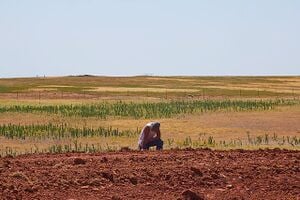The aim of this page is to recognise, celebrate and encourage the self-empowerment of community agency networks (CANs) and community groups across Oklahoma.

 Millions of Californians live near oil and gas wells that are in the path of wildfires, latimes.com (Jul 21, 2024)
Millions of Californians live near oil and gas wells that are in the path of wildfires, latimes.com (Jul 21, 2024)
Events[edit | edit source]
Community energy[edit | edit source]
Wikipedia: Solar power in Oklahoma on rooftops can provide 25% of all electricity used in Oklahoma. Wind power in Oklahoma
Cycling activism[edit | edit source]
Wikipedia: Pathfinder Parkway is a 12-mile (19 km) walking, jogging and biking trail that traverses Bartlesville
Environment quality[edit | edit source]
Oklahoma Department of Environmental Quality
Social inclusion[edit | edit source]
Regional Food Bank of Oklahoma
Sustainable transport activism[edit | edit source]
Friends of the Ouachita Trail - Ouachita National Recreation Trail, 223-mile (359 km) long, continuous hiking trail through the Ouachita Mountains of Oklahoma and Arkansas.
News and comment[edit | edit source]
2023
 ‘It Affects All of Us’: Free Financial Counseling Helps Tulsans Thrive, reasonstobecheerful.world (Jul 13, 2023)
‘It Affects All of Us’: Free Financial Counseling Helps Tulsans Thrive, reasonstobecheerful.world (Jul 13, 2023)
2012
- The City That Shed a Million Pounds, August 23, 2012...[1]
About Oklahoma[edit | edit source]
Oklahoma ( OHK-lə-HOH-mə; Choctaw: Oklahumma, pronounced [oklahómma]) is a state in the South Central region of the United States. It borders Texas to the south and west, Kansas to the north, Missouri to the northeast, Arkansas to the east, New Mexico to the west, and Colorado to the northwest. Partially in the western extreme of the Upland South, it is the 20th-most extensive and the 28th-most populous of the 50 United States. Its residents are known as Oklahomans and its capital and largest city is Oklahoma City.
References